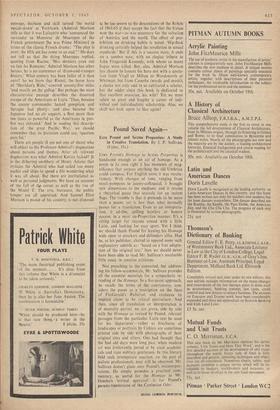Pound Saved Again— Ezra Pound and Sextus Propertius: A Study
in Creative Translation. By J. P. Sullivan. (Faber, 35s.) EzRA POUND'S nontage to Sextus Propertius is handsome enough as an act of homage. As a poem in its own right it has moments of mag- nificence that surpass anything the old Umbrian could compass. For English verse it was revolu- tionary. With changes of lone, ranging from mock-pompous to jaunty-colloquial, it brought new dimensions to the medium; and it retains a rhetorical gusto that scarcely for an instant flags. The trouble is that it pretends to be more than a poem, yet is less than what normally passes for a translation. Even as an interpreth- tion, it ad-libs, spilling howlers or boners passim, in a most un-Propertian manner. It's a sitting target for anyone armed with a little Latin, and looking for easy sport. Yet I think we should thank Pound for leaving his Homage wide open to attackers and defenders alike. Had he, or his publisher, elected to append some such explanatory subtitle as: `based on a free adapta- tion of the original' text,' then we should never have been able to read Mr. Sullivan's invaluable little essay in creative criticism.
Not preaching to the converted, but address- ing his fellow-academicals, Mr. Sullivan provides all the essential materials for a sympathetic re- reading of the Homage. In a five-point approach, he recalls the terms of the controversy, con- siders the poem as a rescription on the lines of FitzGerald's Rubaiyat, and evaluates its implied claim to be critical portraiture. And then, since all translation or interpretation is of necessity partial, we are, given, side by side with the Homage as revised by Pound, relevant passages from the particular Latin text he used for his `departures'—rather as brochures of landscapes or portraits by Cubists are sometimes printed side by side with photographs of their original sites and sitters. One had thought that the bad old days were long past, when modern art was irrelevantly jeered at by staid academi- cals and irate military gentlemen. In this literary field such intemperate reaction, on the part of jealous professionals, may still be observed. Mr. Sullivan doesn't glaze over Pound's misinterpre- tations. He simply provides a practical com- mentary, as useful for the Homage as Mr. Dembo's 'critical appraisal' is for Pound's pseudo-translations of the Confucian Odes.
HUGH GORDON PORTEUS






































 Previous page
Previous page